Breast Cancer Awareness Month
Breast Cancer Awareness Month
October is designated as breast cancer awareness month nationally. October was first designated as breast cancer awareness month back in 1985. It is now my favorite month. Not only is it my birthday month, but this month now has special meaning to me, as a breast cancer survivor.
October is about more than pink ribbons and wearing pink. It is about early detection through monthly breast self exams and/or mammograms.
Breast Cancer Awareness Facts
One in eight women will develop breast cancer during their lifetime. Ironically this means that among a group of eight friends, it is likely that one of them will develop breast cancer.
This year it is estimated that over 252,000 women in the US will be diagnosed with breast cancer. Consequently, it is estimated that over 41,000 people will die of breast cancer this year.
Breast cancer is the most commonly diagnosed cancer in women. Moreover, it is the 2nd leading cause of cancer death in women.
Breast cancer is treatable if detected early. In fact, there is a 98% survival rate if detected early.
October is dedicated to breast cancer awareness. To help raise that awareness, my goal this month is to share breast cancer facts throughout the month. As we know, knowledge is power and it is important to know your risk factors. Knowing these risk factors, will hopefully help women to reduce or even remove those risk factors that are modifiable. For those risk factors that can not be changed, it is equally important to know where you stand. Spread the word to heighten the awareness of breast cancer.
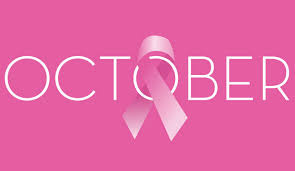
Breast Cancer Awareness Month
- Published in breast cancer, breast cancer awareness, Uncategorized
My Hair Loss and Regrowth Journey
My hair loss and regrowth journey. Like many women with cancer, chemotherapy caused me to lose all of my hair. Yes, every…single…strand. My hair loss and regrowth journey will never be forgotten.
My Hair Loss Journey
Though the hair loss was an expected side effect, I was not fully prepared when the day came. Several people advised me to cut my hair before it fell out, but I could not bring myself to do it. Mostly because I secretly hoped I would be in the slim percentage that didn’t lose my hair. However, I made a decision that at the first sign of hair loss, I would cut it all off. It was estimated that I would lose my hair after the 2nd chemotherapy treatment and boy was that prediction spot on. The day following my second treatment, I brushed my hair in preparation for my follow up appointment and there it was, a brush full of hair! Funny thing is that I never even felt it coming out. Looking at the brush full of hair was extremely scary.
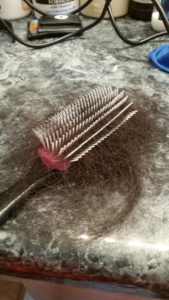
Initially, I panicked and freaked out a bit. “Oh my god, was this really happening?” I wasn’t ready. Truthfully, I would never be ready. I immediately stopped brushing and wore a hat that day and did not comb my hair again for 2 days. My mom was already on stand by to shave my head when I was ready. Unfortunately it was now time to face my fear. My daughter insisted on watching my mother shave my head. This made her sad. Although I pretended to be strong, that strength only lasted for a few minutes.
Saying Goodbye
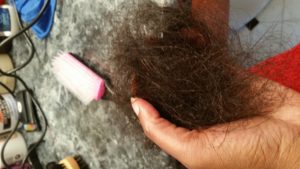
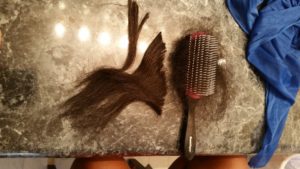
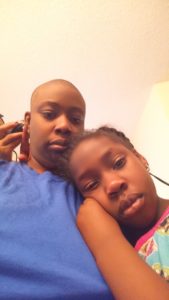
When we first learned that I would need chemo, my mom knew this would be a hard adjustment for me, therefore she vowed that when I lost my hair she would shave hers as well. As soon as she was done shaving my head, without saying a word, she then did her own.
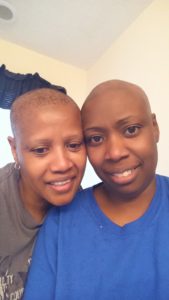
This was an emotional day. Once of the most emotional days since my diagnosis. I now looked like a true “cancer patient”. Looking in the mirror was hard and it took me a several days to truly face a mirror. It was a constant reminder that I had cancer even on days when I wasn’t ill and actually felt well. I did not want my kids, nor husband to see me like this. It took a couple months before I would let them see me without a scarf or wig covering my bald head. My 12 year old son took the longest to adjust. Some people eventually get used to having a bald head and some are even able to embrace it. I never got to that point. As a matter of fact, only my parents, children, and husband ever got to see me with a bald head.
As a female with breast cancer, I learned that a big part of the struggle with hair loss is related to loosing everything that you identify with as a female. First your hair, (and I mean every strand of it from every part of your body including armpits and eye brows) and then your breast.
My Regrowth Journey
What a regrowth journey! I have never had short hair in my life. Neither as a child, nor as an adult. And now I had absolutely no hair at all. Don’t misunderstand, short hair works for some people. I quickly realized that having short hair by choice is not the same as not having a choice in the matter at all.
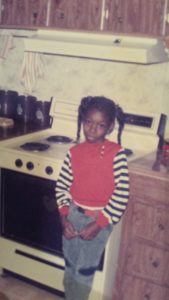
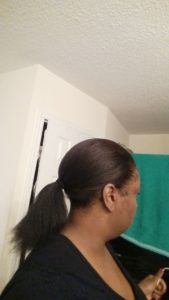
From a clean scalp, to now having a baby afro! My hair is growing back. Still short, but healthy and most importantly still growing. I have decided to share my hair growth journey over the past one year. After despising this comment and hearing it so many times, I can finally now agree that yes, “IT IS HAIR AND IT WILL GROW BACK.”
Everyone’s journey and experiences vary, but despite the differences, it is a difficult time for cancer patients and their families. Support and encouragement are important during this time. Allow your loved one to grieve their hair loss. Allow them to vent. Most importantly, respect their privacy and dignity as they deal with the hair loss in their own way.
- Published in breast cancer, chemotherapy, hair loss, side effects, Uncategorized
10 Common Breast Cancer Myths
You may hear many different breast cancer myths after you are diagnosed with breast cancer. It may be hard for you to separate what is true versus what is not. Here are some of the common myths that you may hear.
10 Common Breast Cancer Myths
1-Most breast cancers run in families.
Yet, only 5%-10% of cases are thought to be hereditary.
2-Breast implants raise your risk of breast cancer.
With implants it may be harder to detect abnormalities on a mammogram, therefore additional X-rays may be ordered.
3-There is nothing you can do to lower your risk of breast cancer.
90% of breast cancers are related to lifestyle and environmental factors. As a result, you can reduce your risk by maintaining a healthy weight, regular exercise, and limit alcohol intake.

4-Most lumps are cancerous.
It is quite the opposite, with 80% of lumps being benign (noncancerours).
5-Underwire bras can cause breast cancer.
Most noteworthy, there is no evidence to support this.
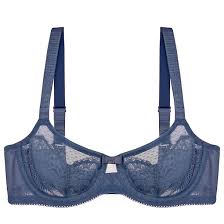
6-Surgery causes breast cancer to spread due to air exposure.
There is no evidence to support this.
7-Regular mammograms prevent breast cancer.
This is not true, however regular mammograms provide early detection.
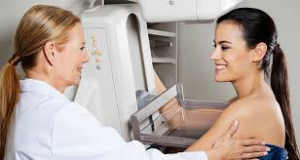
8-Women with small breast have less risk of developing breast cancer.
While this is not true, smaller breast however, may be easier to examine.
9-Antiperspirants cause breast cancer.
Currently there is no evidence to support this.
10-You can not get breast cancer after a mastectomy.
Unfortunately, cancer can spread. Consequently, there can be a reoccurrence in the same breast even after a mastectomy. Reoccurrence can also occur in the opposite breast.
In conclusion, after your diagnosis you may seem like you are getting conflicting information from different sources. First of all, you should always consult your doctor for clarification. Every case of breast cancer is different, so rely on your health care team to provide you with the most relevant information.
- Published in breast cancer, breast cancer myths
Breast Cancer | Your Physician Team
Breast Cancer | Your Physician Team will be responsible for guiding you through your treatment plan.
Now that you, or someone you know, has been diagnosed with breast cancer, your physician team will soon be expanding. For me personally, I went from having a family doctor and a GYN, to having 8 physician specialists! The number of physicians that will be involved in your care is dependent on your treatment plan. Here is a list of some of the physicians that may be consulting/providing care for you.
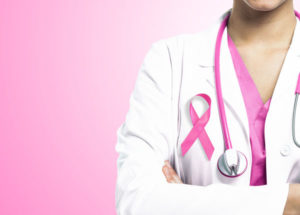
Breast Cancer; Your Physician Team
1-Radiologist: this is the physician who may have performed your biopsy, interpreted the results and/or called you with the shocking news.
2-Surgeon; this is the physician that will perform your breast surgery. This person can be a general surgeon or someone who specializes specifically in breast surgeries.
3-Medical Oncologist; this is the physician who will manage your chemotherapy regimen. Depending on the type of cancer that you have, chemotherapy may or may not be a part of your recommended regimen. This physician also specializes in cancer of various types.
4-Plastic Surgeon; this physician will discuss and/or perform breast reconstruction, if needed. It is possible in some cases for reconstruction to occur at the time of your mastectomy. Because of this, you may meet with this physician earlier in your treatment plan to discuss your options.
5-Radiation Oncologist; this is the physician that will manage your radiation regimen. Radiation is not always recommended for treatment of breast cancer. This will be depend on the type of breast cancer that you have and whether it has spread to your lymph nodes.
Since every case of breast cancer is different, your physician team can vary as well. In addition to the physicians listed above, you may have other physicians and healthcare workers involved in your care. They may include a psychologist, dietician, nurse navigator, and/or social worker. In my case, I also had a urologist, dermatologist, and podiatrist consulting in my care to manage some of the side effects of the chemotherapy. Regardless of the make up of your team, the primary goal is to help you make the best informed decisions regarding your care.
Choosing a Physician
Your radiologist or oncologist may have physician recommendations for you. It is important to choose a physician that you feel comfortable with. In an already confusing time, having a physician that you are comfortable with will make a big difference. There are many things to consider when choosing a physician. Each persons choice is dependent on what is most important them.
- Published in breast cancer, physician team
Breast Cancer Support | What To Say When You Don’t Know What To Say?
Breast Cancer Support
How do you show your support after a breast cancer diagnosis? What do you say when you don’t know what to say? Until I was faced with my own journey, I never realized quite how delicate the topic can be.
So your loved one or close friend had been diagnosed with breast cancer. You want to be supportive and you want them to know that you are there for them. What are the right words to say? Most importantly, what words should you avoid? The answer is simple, yet complicated. Everyone’s response to their diagnosis is unique. Some may experience the grieving process where they are in denial at first, some may be totally devastated, while others, may have a sense of peace. This is not all inclusive, as many people will have all these feelings, at some point, like me.
So what do you say? My personal advice is to first be OK with saying nothing and just being there when needed. Some people feel that they have to say something encouraging. Encouragement is always helpful, and seems simple but I learned during my journey that what may be encouraging to the sender wasn’t always encouraging to me. I would like to first share those things that helped encouraged me during my journey. Then I will share those comments that weren’t helpful at all.
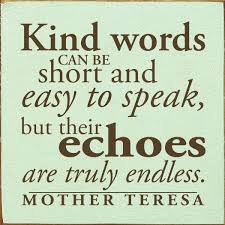
5 Things That Were Most Encouraging
1-Regular text messages
I had 4 people in my life that would send me a message of encouragement on EVERY chemo day. Though I dreaded going to my chemo treatments, I looked forward to my Wednesday messages.
2-People that let me vent
Often times I did not need anyone’s advice, nor their opinion. Sometimes, I just wanted to vent. I was angry and frustrated and wanted to let that out. I also enjoyed time to share my story and experience, once I was ready.
3-People that allowed me to cry
Those were tears of sadness, despair, and often times discouragement. I just wanted to let them out. As unhealthy as it sounds, I wanted permission to have a pity party (briefly) and not feel like I was weak, or not holding it together.
4-People that didn’t debate my decision or feelings
As mentioned, I didn’t seek much advice or opinions. What I was feeling was my perception, therefore my reality. I had periods of irrational thinking, where I wanted to stop treatments, or even change my treatment plan. But there were also some decisions that not everyone agreed with, like me decision to not have a bilateral mastectomy. I needed that ability to make decisions without judgement. There were times when I felt defeated and really sick, and I appreciate those people who just listened and sympathized with my feelings.
5-Meals
I didn’t appreciate the meals at first because I had no appetite and food was the last thing on my mind. But having meals for my family relieved some burden. Our church family was extremely helpful in this area. I even had friends that gave gift cards to fast food restaurants. Likewise, those were equally helpful. Especially on those days where my doctors appointments and chemo treatment took up an entire day. It was easy to grab a pizza for dinner on the way home. If you don’t know what to do to show support, drop a gift card in the mail, those were some of my most pleasant surprises.
5 Not So Helpful Comments and Feedback
1-Being told I was strong
As crazy as that sounds, when I was at my weakest point, the last thing I wanted to hear was that I was strong. What did that mean anyway? I could not think of another instance in my life where I had to pull on the strength that was needed to get through cancer. To me, the strength was not there at all. I had never experienced anything as hard to deal with as cancer.
2-Being told I should wear a bald head, with no wig
Losing my hair was debilitating enough. There was absolutely no way that I was going out in public with a clean head. To me the baldness reminded me of the struggles that I was facing and a chapter in my life that I did not want to be in. Yes, there are a lot of people with no hair who embraced it. I wasn’t one of them.
3-Being told that I looked good
Although I know it was intended as a compliment, it wasn’t always received that way. I often felt that it was expected that I would look bad. In spite of the fact that the outward appearance may not have looked it, the inside was totally torn apart. I felt way worse than I looked.
4-Being told they heard there was a cure for cancer
This almost made the top of the list. These comments literally made me want to explode. I would love for there to be a cure for cancer. It was just hard for me to believe that there was a cure out there and my oncologist and other doctors were holding out on me.
5-Being told about other people who had cancer
Hearing of other peoples diagnosis initially made me very sad. It was hard to hear of so many peoples lives being turned upside down like mine. Stories with good outcomes were sometimes uplifting, but not always.
It is hard to watch your loved one or friend suffer. One of the most important things you can do it just listen and be there. Offer specific help rather than the opened ended offer of “let me know if you need anything”. If they are like me, we are likely to seek out help. Expect an array of emotions, and don’t pass judgement. Allow for privacy. While I felt open with my diagnosis and talking about it, I was very private when it came to doctors appointment and chemo treatments. I only felt comfortable with my immediate family present, as those appointments often brought out emotions that I did not always want to share openly.
Everyone is different in the way that they respond to their diagnosis. Listening to your loved ones or friends needs, and just binge there for support, goes a long way.
- Published in breast cancer, Support

